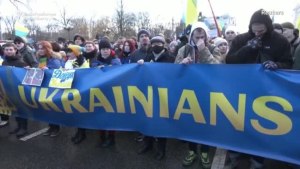Once divided, Ukrainians are thinking about how to rebuild their nation and are prioritizing national interests over regional ones.
It’s undeniable that Russia’s ongoing war on Ukraine has wrought devastating death and destruction on the Ukrainian people and their country. Millions of Ukrainians have been forced to flee their homes, with many of them seeking refuge abroad.
Yet despite their incredible hardships, Ukrainians have been united in rallying around their country and their president from the beginning of the invasion, contradicting claims that theirs is a deeply divided society.
Over the years, pundits have asserted that Ukraine is separated into pro-European and pro-Russian parts, socially and politically. Putin went further than that, famously claiming that Ukraine is not a real country and that Ukrainians are not a distinct people.
But as the war has unfolded, Ukrainians have proved Putin was wrong. He catastrophically miscalculated, as demonstrated by the fact that the country and its people are now more united than divided.
We are scholars of contemporary Ukraine. Among other things, our work involves assessing the attitudes of Ukrainians toward their government and how those attitudes have changed over time and across the country. Our survey research, conducted with Khrystyna Pelchar, a graduate student in political science at West Virginia University, shows the depth of this growing national consensus.
A united Ukraine
From the immediate calls to defend the country in the first days of the Russian invasion to the near-unanimous belief in a Ukrainian victory a year later, Ukrainians have been determined to defend their independence and united in the ways they want to rebuild after the war.
Ukraine is a complex country with stubborn problems. Widespread government corruption, a lingering remnant from its time as part of the Soviet Union, is one of them. But the country has moved forward in steps.
For instance, the Revolution of Dignity, Ukraine’s three-month civic uprising in late 2013 and early 2014, led to then-President Viktor Yanukovych’s ouster for his refusal to sign an association agreement with the European Union. Yanukovych’s administration also faced allegations of widespread corruption. The country’s acting chief prosecutor accused Yanukovych and his political allies of stealing up to US$100 billion from Ukrainian citizens.
The government that came to power after early elections in 2019 ushered in new rules to bring Ukraine more in line with the European Union’s standards of governance. These included reforms designed to reduce corruption, such as an e-declaration system that required public officials to declare their wealth.
Even as Ukraine fends off Russian armed forces, President Volodymyr Zelenskyy continues the nation’s anti-corruption reforms.
Public opinion polls, including those conducted by the Ukrainian agency Info Sapiens, show major events like the Revolution of Dignity and Russia’s invasion have united Ukrainians. Their monthly polls ask how Ukrainians feel about the direction of the country.
After these critical events, there have been substantial spikes in the proportion of Ukrainians who thought the country was moving in the right direction. These are indications of the well-known rally-round-the-flag effect.

A national vision for the future
Recent polling also shows a dramatic spike in citizens’ approval of their government and an enormous jump in Zelensky’s approval ratings. While these rallies in public opinion are not new, what is new is what lies underneath.
The protests of late 2013 and early 2014 were not viewed uniformly across the country. The east and south of Ukraine did not share the enthusiasm that the rest of the country expressed. But by the time of the 2022 invasion, Ukrainians’ attitudes about the country’s direction had begun to change and become more consistent nationally.
The effects of national rallying are apparent in personal behavior as well. The reported use of the Ukrainian language has increased since February 2022, notably in parts of Ukraine that have been traditionally viewed as Russian-speaking. While the change is small, the implications are substantial: Ukrainians are behind their language and culture as well as their government.
This growing national consensus extends even further. We included a question on a recent poll conducted by the Kyiv International Institute of Sociology, a well-respected survey firm, asking Ukrainians about their reconstruction priorities after the end of hostilities. Regional differences in attitudes about priorities were small.
Across the country, people consistently supported rebuilding national defense, housing and energy at roughly the same level, and well above other needs like health care, education, communications and transportation.
Why is this important? Ukrainians in the western part of the country have personally experienced considerably less displacement due to the destruction of housing than their eastern counterparts. Yet, according to our data, instead of placing housing as a low priority, Western Ukrainians view it as one of the most important postwar investments, suggesting that narrow regional interests are not superseding the clear needs of citizens who live elsewhere in the country.
Superficial snapshots in time that made the case for Ukraine’s being a ticking time bomb because of its internal differences have been dramatically debunked as the country has united to fight an existential war of survival.
While we are confident that we are witnessing a convergence in national perspectives on important issues, polling in wartime has a number of pitfalls. Respondents might feel influenced by the circumstances and not totally free to render an honest opinion. The question going forward is the extent to which this unity can be sustained as the war continues and through what will be a difficult postwar reconstruction.
We believe that it is vital in any discussion of this conflict and its aftermath to consider not only the hard facts on the ground, but also the attitudes of Ukrainians themselves.
Erik S. Herron is a professor of political science at West Virginia University and Ralph S. Clem is a professor emeritus of geography at Florida International University.
This article is republished from The Conversation under a Creative Commons license. Read the original article.

